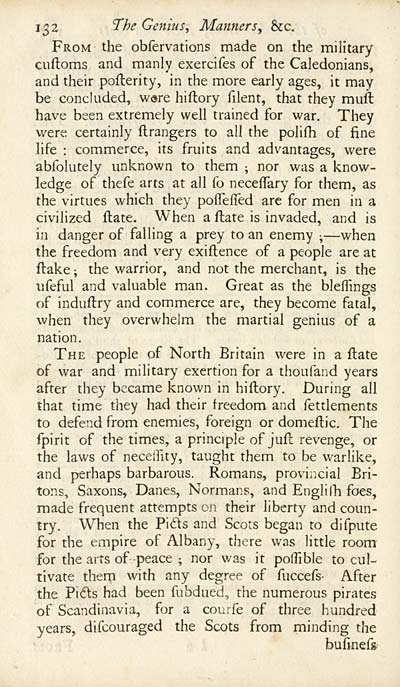Blair Collection > Critical dissertations on the origin, antiquities, language, government, manners, and religion, of the antient Caledonians, their posterity the Picts, and the British and Irish Scots
(170)
Download files
Complete book:
Individual page:
Thumbnail gallery: Grid view | List view

132 '^he Genius^ Manners , &c.
From the obfervations made on the military
cuftoms and manly exercifes of the Caledonians,
and their pofterity, in the more early ages, it may
be concluded, ware hiftory filent, that they muft
have been extremely well trained for war. They
were certainly flrangers to all the polifh of fine
life : commerce, its fruits and advantages, were
abfolutely unknown to them ; nor was a know-
ledge of thefe arts at all fo neceffary for them, as
the virtues which they pofTelTed are for men in a
civilized itate. When a ftate is invaded, and is
in danger of falling a prey to an enemy ^ — when
the freedom and very exiflence of a people are at
ftakc; the warrior, and not the merchant, is the
ufeful and valuable man. Great as the bleflings
of induftry and commerce are, they become fatal,
when they overwhelm the martial genius of a
nation.
The people of North Britain were in a ftate
of war and military exertion for a thoufand years
after they became known in hiftory. During all
that time they had their freedom and fettlements
to defend from enemies, foreign or domeftic. The
fpirit of the times, a principle of juft revenge, or
the laws of neceihty, taught them to be warlike,
and perhaps barbarous. Romans, provirjcial Bri-
tons, Saxons, Danes, Normans, and Englilh foes,
made frequent attempts on their liberty and coun-
try. When the Pids and Scots began to difpute
for the empire of Albany, there was little room
for the arts of -peace ; nor was it poflible to cul-
tivate them with any degree of fuccefs- After
the Pi6ts had been fubdued, the numerous pirates
of Scandinavia, for a courfe of three hundred
years, difcouraged the Scots from minding the
bufinefg
From the obfervations made on the military
cuftoms and manly exercifes of the Caledonians,
and their pofterity, in the more early ages, it may
be concluded, ware hiftory filent, that they muft
have been extremely well trained for war. They
were certainly flrangers to all the polifh of fine
life : commerce, its fruits and advantages, were
abfolutely unknown to them ; nor was a know-
ledge of thefe arts at all fo neceffary for them, as
the virtues which they pofTelTed are for men in a
civilized itate. When a ftate is invaded, and is
in danger of falling a prey to an enemy ^ — when
the freedom and very exiflence of a people are at
ftakc; the warrior, and not the merchant, is the
ufeful and valuable man. Great as the bleflings
of induftry and commerce are, they become fatal,
when they overwhelm the martial genius of a
nation.
The people of North Britain were in a ftate
of war and military exertion for a thoufand years
after they became known in hiftory. During all
that time they had their freedom and fettlements
to defend from enemies, foreign or domeftic. The
fpirit of the times, a principle of juft revenge, or
the laws of neceihty, taught them to be warlike,
and perhaps barbarous. Romans, provirjcial Bri-
tons, Saxons, Danes, Normans, and Englilh foes,
made frequent attempts on their liberty and coun-
try. When the Pids and Scots began to difpute
for the empire of Albany, there was little room
for the arts of -peace ; nor was it poflible to cul-
tivate them with any degree of fuccefs- After
the Pi6ts had been fubdued, the numerous pirates
of Scandinavia, for a courfe of three hundred
years, difcouraged the Scots from minding the
bufinefg
Set display mode to: Large image | Transcription
Images and transcriptions on this page, including medium image downloads, may be used under the Creative Commons Attribution 4.0 International Licence unless otherwise stated. ![]()
| Permanent URL | https://digital.nls.uk/76288481 |
|---|
| Description | A selection of books from a collection of more than 500 titles, mostly on religious and literary topics. Also includes some material dealing with other Celtic languages and societies. Collection created towards the end of the 19th century by Lady Evelyn Stewart Murray. |
|---|
| Description | Selected items from five 'Special and Named Printed Collections'. Includes books in Gaelic and other Celtic languages, works about the Gaels, their languages, literature, culture and history. |
|---|

